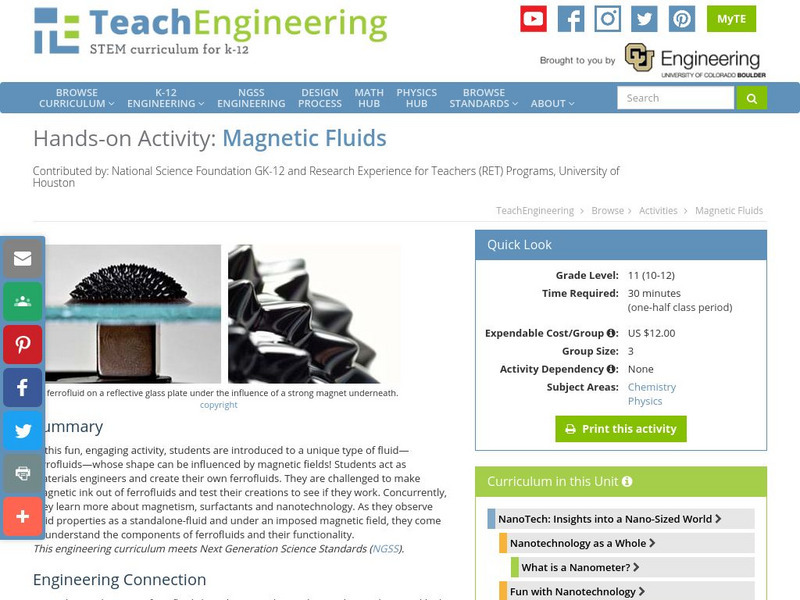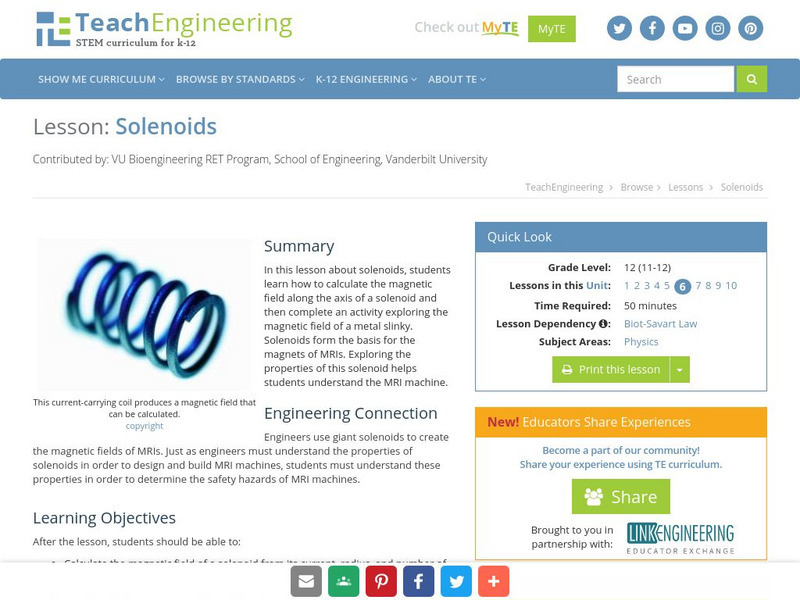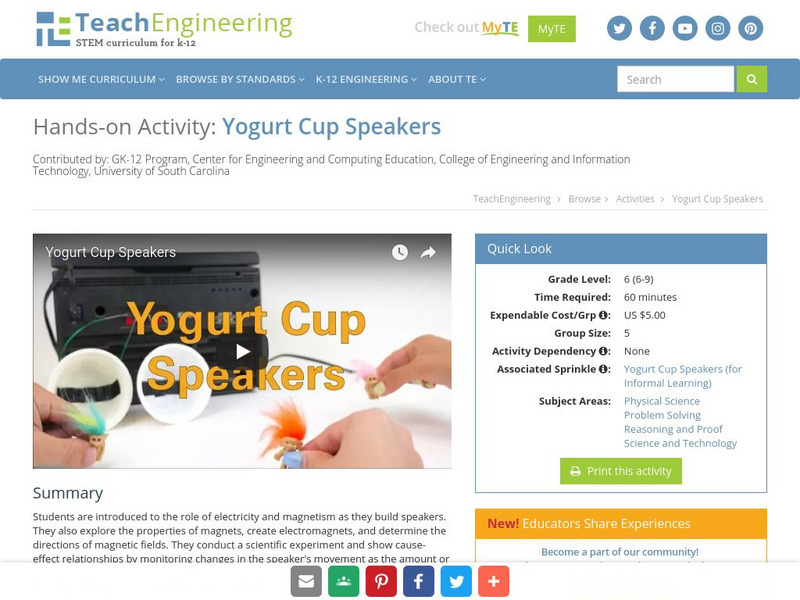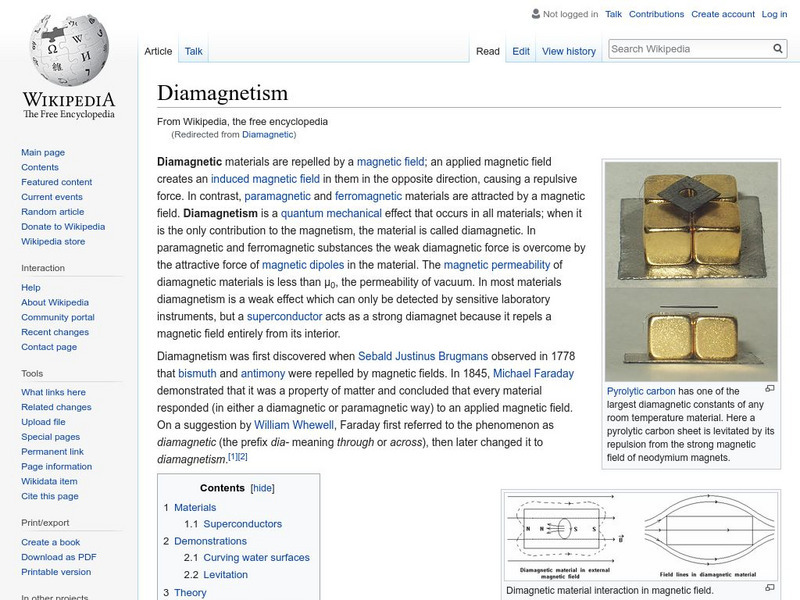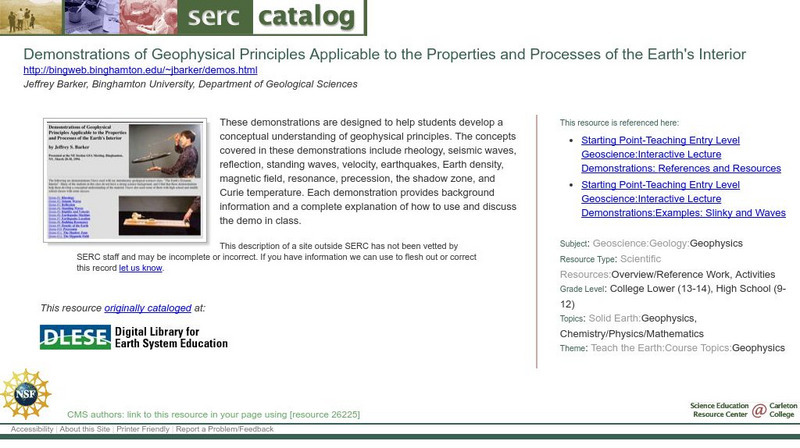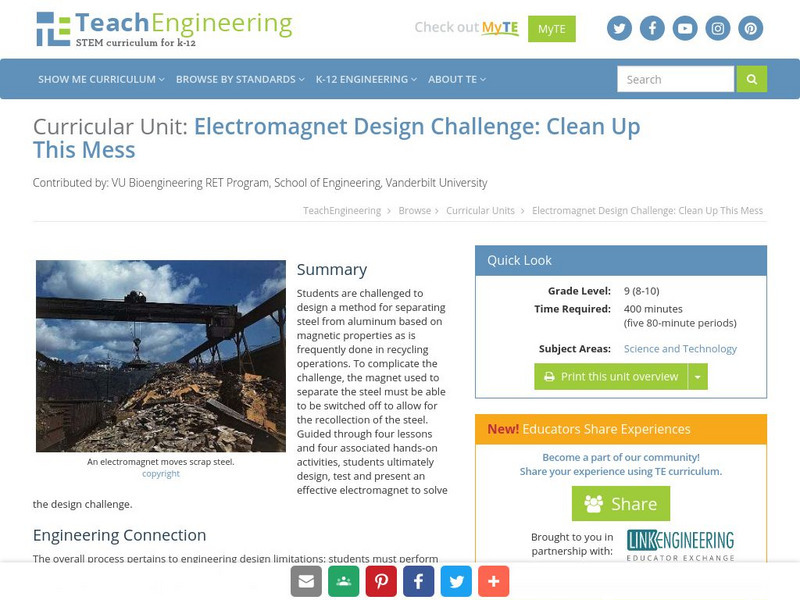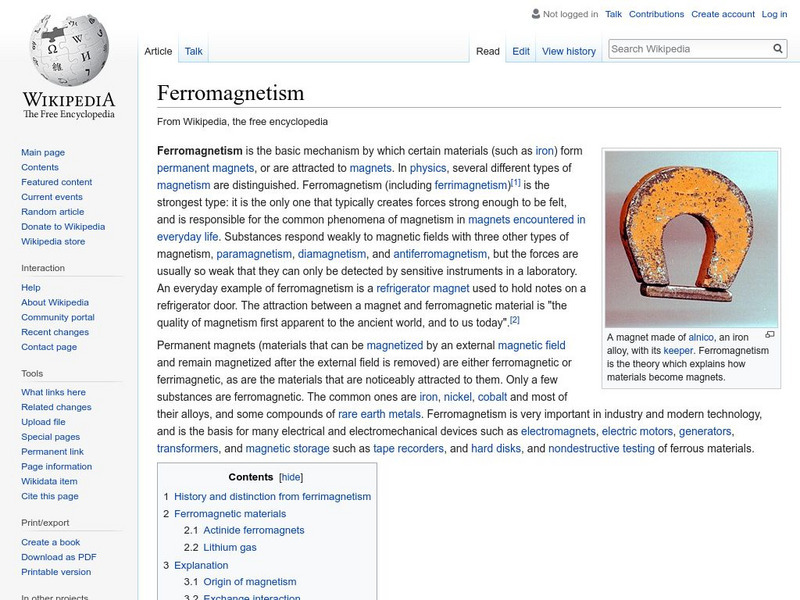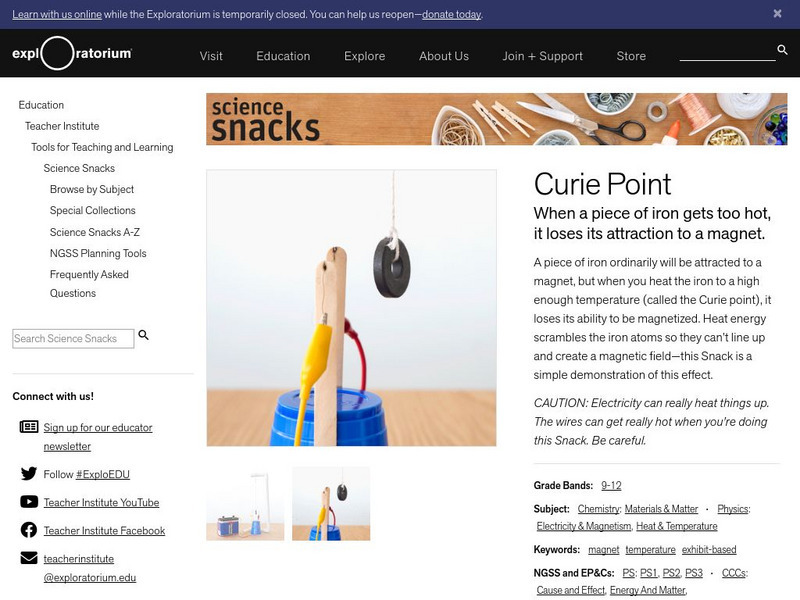TeachEngineering
Teach Engineering: Magnetic Fluids
In this fun, engaging activity, students are introduced to a unique type of fluid--ferrofluids--whose shape can be influenced by magnetic fields! Students act as materials engineers and create their own ferrofluids. They are challenged...
TeachEngineering
Teach Engineering: Magnetic or Not?
Students explore the basic magnetic properties of different substances, particularly aluminum and steel. There is a common misconception that magnets attract all metals, largely due to the ubiquity of steel in metal products. The...
National High Magnetic Field Laboratory
Magnet Academy: Joseph Henry
Joseph Henry was an American scientist who pioneered the construction of strong, practical electromagnets and built one of the first electromagnetic motors. During his experiments with electromagnetism, Henry discovered the property of...
National High Magnetic Field Laboratory
Magnet Academy: Edward Purcell
Edward Mills Purcell was an American physicist who received half of the 1952 Nobel Prize for Physics for his development of a new method of ascertaining the magnetic properties of atomic nuclei. Known as nuclear magnetic resonance...
National High Magnetic Field Laboratory
Magnet Academy: Lodestone 600 Bc
The history of electricity and magnetism starts with this special mineral possessing amazing, and still mysterious, properties.
Florida State University
Florida State University: Magnet Lab: Dilution Refrigerators
Dilution fridges owe their cooling power to the incredible element helium. This animation illustrates how dil fridges exploit the element's properties to make things very, very cold.
Open Curriculum
Open Curriculum: Relativity and Magnetism
Understand and learn about the properties of space and time and the concept of relativity.
Other
Bsi Education: Electrical Properties
The Applied Science resource consists of practical activities that demonstrate the importance of standard procedures in scientific work. Students examine electrical properties through a variety of activities. Some topics investigated are...
Science Struck
Science Struck: The Relationship Between Magnetism and Electricity
Provides a short explanation of the similarities between magnetism and electricity, the properties of their fields, and the effect they each have on a charged particle.
PBS
Pbs Teachers:magnetic Storm: Visualizing Magnetic Fields
Explore the magnetic fields around different shapes of magnets.
TeachEngineering
Teach Engineering: Solenoids
This lesson discusses solenoids. Students learn how to calculate the magnetic field along the axis of a solenoid and complete an activity exploring the magnetic field of a metal slinky. Solenoids form the basis for the magnet of an MRI....
American Chemical Society
American Chemical Society: Science for Kids: Characteristics of Materials
Engaging hands-on science lessons for grades 2-6 on the properties of different materials.
TeachEngineering
Teach Engineering: Yogurt Cup Speakers
This lesson introduces students to the role of electricity and magnetism as they build a speaker. In addition, students explore properties of magnets, create an electromagnet, and determine the direction of a magnetic filed. They conduct...
Science Struck
Science Struck: Properties, Types, and Applications of Alnico Magnets
An alnico magnet is a special type of magnet that combines several metals in order to adapt the magnet for different applications. Learn about their properties, the different types, how they are manufactured, and what they are used for.
National High Magnetic Field Laboratory
Magnet Academy: Heinrich Hertz
The discovery of radio waves, which was widely seen as confirmation of James Clerk Maxwell's electromagnetic theory and paved the way for numerous advances in communication technology, was made by German physicist Heinrich Hertz. In the...
Wikimedia
Wikipedia: Diamagnetism
Wikipedia.com offers a good introduction to diamagnetism and diamagnetic materials, including discussion of how superconductors exhibit diamagnetic properties.
Florida State University
Florida State University: Basic Electromagnetic Wave Properties
This Florida State University page includes an interactive java tutorial that explores the relationship between frequency, wavelength, and energy, and enables the visitor to adjust the intensity of the radiation and to set the wave into...
Science Education Resource Center at Carleton College
Serc: Geophysical Demos Properties and Processes of Earth's Interior
These demonstrations allow students to develop a conceptual understanding of geophysical principles. Each demonstration provides background information and a complete explanation of how to use and discuss the demo in class.
TeachEngineering
Teach Engineering: Clean Up This Mess
Students are challenged to design a method for separating steel from aluminum based on magnetic properties as is frequently done in recycling operations. To complicate the challenge, the magnet used to separate the steel must be able to...
TeachEngineering
Teach Engineering: Building an Electromagnet
Students design and construct an electromagnet that must pick up 10 staples. They begin with only minimal guidance, and after the basic concept is understood, are informed of the properties that affect the strength of that magnet. They...
Cuemath
Cuemath: Vectors
Explore the world of vectors, by finding answers to questions like what are vectors, what are scalars, what is the difference between scalar and vectors, the magnitude of a vector, operations on vectors, and properties of a vector.
PBS
Pbs Teachers: Scientific American: 21st Century Medicine: Image Guided Surgery
Investigate the science and medical diagnostic uses of magnetic resonance imaging (MRI) technology. Perform experiments to observe how magnetic properties can be induced, and measure the force of temporary magnets.
Wikimedia
Wikipedia: Ferromagnetism
This site from Wikipedia provides a wonderful in-depth explanation of ferromagnetism, covering the atomic behavior which is responsible for ferromagnetic properties. Also introduces the concepts of magnetic domains and the Curie...
Exploratorium
Exploratorium: Science Snacks: Curie Point
Did you know that a piece of iron can lose its magnetism if heated too high? There is a point called the Curie point when iron is heated to a high enough temperature that its iron atoms are scrambled and can't line up to form a magnetic...


